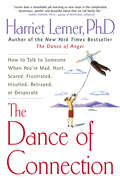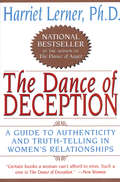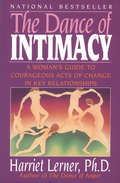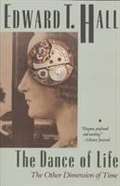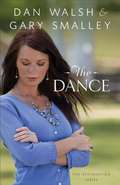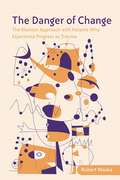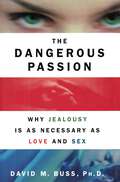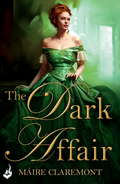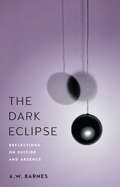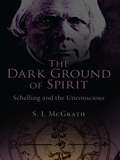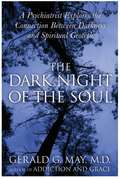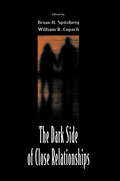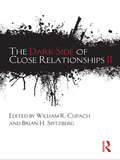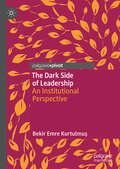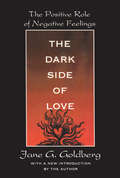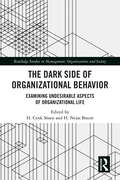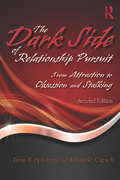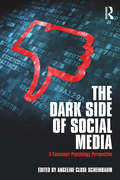- Table View
- List View
The Dance of Connection
by Harriet LernerIn her most affirming and life-changing book yet, Dr. Harriet Lerner teaches us how to restore love and connection with the people who matter the most. In The Dance of Connection we learn what to say (and not say) when: We need an apology, and the person who has harmed us won't apologize or be accountable. We don't know how to take a conversation to the next level when we feel desperate. We feel worn down by the other person's criticism, negativity, or irresponsible behavior. We have been rejected or cut off, and the other person won't show up for the conversation. We are struggling with staying or leaving, and we don't know our "bottom line." We are convinced that we've tried everything -- and nothing changes.Filled with compelling personal stories and case examples, Lerner outlines bold new "voice lessons" that show us how to speak with honor and personal integrity, even when the other person behaves badly. Whether we're dealing with a partner, parent, sister, or best friend, The Dance of Connection teaches us how to navigate our most important relationships with clarity, courage, and joyous conviction.
The Dance of Deception: Pretending and Truth-Telling in Women's
by Harriet LernerWhen The Dance of Deceptionwas published, Lerner discovered that women were not eager to identify with the subject. "Well, I don't do deception" was a common resonse.We all "do deception", often with the intention to protect ourselves and the relationships we depend on. The Dance of Deceptionunravels the ways (and whys) that women show the false and hide the real -- even to our own selves. We see how relationships are affected by lying and faking, by silence and pretending and by brave -- but misguided -- efforts to tell the truth.Truth-telling is at the heart of what is most central in women's lives. It is at the foundation of authenticity and creativity, intimacy and joy. Yet in the name of "honesty", we can bludgeon each other. We can approach a difficult issue with such a poor sense of timing and tact that we can actually shut down the lines of communication rather than widening the path of truth-telling.Sometimes Lerner's advice takes a surprising turn -- for example, when she asks us to engage in a bold act of pretending in order to discover something "more real"; or when she tells us not to parachute down on our family to bring up a "hot issue" without laying the necessary groundwork first.Whether the subject is affairs, family secrets, sexual faking or the challenge of "being oneself", Lerner helps us to discover, speak and live our own truths.
The Dance of Deception: Pretending and Truth-Telling in Women's Lives
by Harriet G. LernerDrawing on more than two decades of clinical experience, Dr. Lerner articulates her rich philosophy and thoughtful guidelines about speaking out, from sexual faking to family secrets.
The Dance of Interaction
by Jeanine FitzgeraldSuggests creative solutions for handling challenging behaviors of children.
The Dance of Intimacy
by Harriet G. LernerA wise and compassionate book that will teach the reader much about the complex emotions our family and love relationships engender.
The Dance of Intimacy: A Woman's Guide to Courageous Acts of Change in Key Relationships
by Harriet LernerIn The Dance of Intimacy, the bestselling author of The Dance of Anger outlines the steps to take so that good relationships can be strengthened and difficult ones can be healed. Taking a careful look at those relationships where intimacy is most challenged--by distance, intensity, or pain--she teaches us about the specific changes we can make to achieve a more solid sense of self and a more intimate connectedness with others. Combining clear advice with vivid case examples, Dr. Lerner offers us the most solid, helpful book on intimate relationships that both women and men may ever encounter.
The Dance of Life: The Other Dimension of Time
by Edward T. Hall<p>In his pioneering work The Hidden Dimension, Edward T. Hall spoke of different cultures' concepts of space. Now The Dance of Life reveals the ways in which individuals in culture are tied together by invisible threads of rhythm and yet isolated from each other by hidden walls of time. Hall shows how time is an organizer of activities, a synthesizer and integrator, and a special langauge that reveals how we really feel about each other. <p>Time plays a central role in the diversity of cultures such as the American and the Japanese, which Hall shows to be mirror images of each other. He also deals with how time influences relations among Western Europeans, Latin Americans, Anglo-Americans, and Native Americans.</p>
The Dance: A Novel (Book 1 in the Restoration Series)
by Gary Smalley Dan WalshJim Anderson is a successful businessman, and his wife, Marilyn, is the perfect wife. And why wouldn't she be? He gives her everything she needs. That's why Jim never expected to come home one day and find Marilyn gone. After 27 years of marriage, Marilyn has had enough of feeling unloved and neglected. She wants to experience some measure of happiness before she's too old to enjoy it, even signing up for dance lessons, something Jim would never do. What will it take for Jim to finally become the man Marilyn needs him to be? Combining the literary talents of bestselling author Dan Walsh and the relationship expertise of bestselling author Gary Smalley, The Dance is the first novel in The Restoration Series. Readers will get caught up in these flawed but sincere members of the Anderson family as they rediscover genuine love and start a transformation that ultimately affects all of them.
The Danger of Change: The Kleinian Approach with Patients Who Experience Progress as Trauma
by Robert WaskaConfusing clinical standoffs, loyalty to self-destruction and abrupt terminations are challenging and under-examined problems for the modern psychoanalytic practitioner. The Danger of Change is a timely book that addresses the so-called resistant patient so many clinicians are familiar with. Robert Waska blends theory based on Melanie Klein’s classical stance with the more contemporary Freudian/Kleinian school, to demonstrate how to understand patients that are resistant to progress. Divided into four sections, this book covers: reluctant patients and the fight against change: caught between the paranoid and depressive world greed and the dangers of change interruptions to the process of change: loss, envy, and the death instinct working toward change in the face of overwhelming odds Extensive and detailed clinical material is used to bring clarity to subjects including symbolism, conflict resolution, projective identification, the depressive and paranoid positions, change and trust. The Danger of Change brings hope and clarity to cases involving patients who experience progress as a threat to their emotional wellbeing. It will be of great interest to all practising psychoanalysts, as well as those studying psychoanalytic theory and practice.
The Dangerous Case of Donald Trump: 27 Psychiatrists and Mental Health Experts Assess a President
by Gail Sheehy Noam Chomsky Tony Schwartz Judith Lewis Herman James Gilligan Philip Zimbardo Nanette Gartrell John D. Gartner Edwin B. Fisher Robert Jay Lifton William J. Doherty Esq. Lance Dodes M. P. H. Rosemary Sword Bandy X. Lee Craig Malkin Michael J. Tansey David M. Reiss Henry J. Friedman Jennifer Contarino Panning Psy.D. Luba Kessler Steve Wruble Thomas Singer Dee Mosbacher Leonard L. Glass Howard H. Covitz James A. Herb M.A. Diane Jhueck L.M.H.C. D.M.H.P. A.B.P.P. Betty P. Teng M.F.A. L.M.S.W. Harper West M.A. L. L. P. Elizabeth Mika M.A. L.C.P.C.<P>More than two dozen psychiatrists and psychologists offer their consensus view that Trump's mental state presents a clear and present danger to our nation and individual well-being.This is not normal.Since the start of Donald Trump’s presidential run, one question has quietly but urgently permeated the observations of concerned citizens: What is wrong with him? <P>Constrained by the American Psychiatric Association’s “Goldwater rule,” which inhibits mental health professionals from diagnosing public figures they have not personally examined, many of those qualified to answer this question have shied away from discussing the issue at all. The public has thus been left to wonder whether he is mad, bad, or both. <P>In THE DANGEROUS CASE OF DONALD TRUMP, twenty-seven psychiatrists, psychologists, and other mental health experts argue that, in Mr. Trump’s case, their moral and civic “duty to warn” America supersedes professional neutrality. They then explore Trump’s symptoms and potentially relevant diagnoses to find a complex, if also dangerously mad, man.Philip Zimbardo and Rosemary Sword, for instance, explain Trump’s impulsivity in terms of “unbridled and extreme present hedonism.” Craig Malkin writes on pathological narcissism and politics as a lethal mix. Gail Sheehy, on a lack of trust that exceeds paranoia. Lance Dodes, on sociopathy. Robert Jay Lifton, on the “malignant normality” that can set in everyday life if psychiatrists do not speak up. <P>His madness is catching, too. From the trauma people have experienced under the Trump administration to the cult-like characteristics of his followers, he has created unprecedented mental health consequences across our nation and beyond.It’s not all in our heads. It’s in his. <P><b>A New York Times Bestseller</b>
The Dangerous Case of Donald Trump: Based on the Yale Conference, Two Dozen Mental Health Experts Assess a President
by Bandy X. LeeThe New York Times bestseller! More than two dozen psychiatrists and psychologists offer their consensus view that Trump's mental state presents a clear and present danger to our nation and individual well-being. This is not normal. Since the start of Donald Trump's presidential run, one question has quietly but urgently permeated the observations of concerned citizens: What is wrong with him? Constrained by the American Psychiatric Association's "Goldwater rule," which inhibits mental health professionals from diagnosing public figures they have not personally examined, many of those qualified to answer this question have shied away from discussing the issue at all. The public has thus been left to wonder whether he is mad, bad, or both. In THE DANGEROUS CASE OF DONALD TRUMP, twenty-seven psychiatrists, psychologists, and other mental health experts argue that, in Mr. Trump's case, their moral and civic "duty to warn" America supersedes professional neutrality. They then explore Trump's symptoms and potentially relevant diagnoses to find a complex, if also dangerously mad, man. Philip Zimbardo and Rosemary Sword, for instance, explain Trump's impulsivity in terms of "unbridled and extreme present hedonism. " Craig Malkin writes on pathological narcissism and politics as a lethal mix. Gail Sheehy, on a lack of trust that exceeds paranoia. Lance Dodes, on sociopathy. Robert Jay Lifton, on the "malignant normality" that can set in everyday life if psychiatrists do not speak up. His madness is catching, too. From the trauma people have experienced under the Trump administration to the cult-like characteristics of his followers, he has created unprecedented mental health consequences across our nation and beyond. It's not all in our heads. It's in his. "There will not be a book published this fall more urgent, important, or controversial than The Dangerous Case of Donald Trump. . . profound, illuminating and discomforting" --Bill Moyers
The Dangerous Edge: The Psychology of Excitement
by Michael J. Aptera GREAT book on people's attraction to danger
The Dangerous Passion: Why Jealousy Is as Necessary as Love and Sex
by David M. BussWhy do men and women cheat on each other? How do men really feel when their partners have sex with other men? What worries women more -- men who turn to other women for love or men who simply want sexual variety in their lives? Can the jealousy husbands and wives experience over real or imagined infidelities be cured? Should it be? In this surprising and engaging exploration of men's and women's darker passions, David Buss, acclaimed author of The Evolution of Desire, reveals that both men and women are actually designed for jealousy. Drawing on experiments, surveys, and interviews conducted in thirty-seven countries on six continents, as well as insights from recent discoveries in biology, anthropology, and psychology, Buss discovers that the evolutionary origins of our sexual desires still shape our passions today. According to Buss, more men than women want to have sex with multiple partners. Furthermore, women who cheat on their husbands do so when they are most likely to conceive, but have sex with their spouses when they are least likely to conceive. These findings show that evolutionary tendencies to acquire better genes through different partners still lurk beneath modern sexual behavior. To counteract these desires to stray -- and to strengthen the bonds between partners -- jealousy evolved as an early detection system of infidelity in the ancient and mysterious ritual of mating. Buss takes us on a fascinating journey through many cultures, from pre-historic to the present, to show the profound evolutionary effect jealousy has had on all of us. Only with a healthy balance of jealousy and trust can we be certain of a mate's commitment, devotion, and true love.
The Dark Affair: Mad Passions Book 3 (Mad Passions)
by Maire ClaremontA richly romantic and enthralling novel of beauty, passion and scandalous secrets from Maire Claremont, the acclaimed author of The Dark Lady and Lady In Red. Perfect for fans of Sherry Thomas, Johanna Lindsey and Lisa Kleypas.Lady Margaret Cassidy left a life of nobility behind in Ireland, forsaking her grieving homeland to aid war-ravaged men in England. Still, she never expected a cruel turn of fate to lock her into an unwanted betrothal with one of her English patients - much less one as broken and dangerous as Viscount Powers.Wrecked by his tragic past, Powers' opiate-addled sanity hangs precariously in the balance, leaving him poised to destroy anyone who dares to utter the names of the wife and child he still so deeply mourns. So when he is forced to marry Margaret in exchange for freedom, he is shocked by the desire to earn her trust, her body, and - most alarming of all - her heart...For more deliciously dark Victorian romance, try all the titles in the Mad Passions series: The Dark Lady, Lady In Red, A Lady Undone and The Dark Affair, and check out Maire's alter-ego Eva Devon for sexy and laugh-out-loud funny Regencies.
The Dark Eclipse: Reflections on Suicide and Absence
by A. W. BarnesThe Dark Eclipse is a book of personal essays in which author A.W. Barnes seeks to come to terms with the suicide of his older brother, Mike. Using source documentation—police report, autopsy, suicide note, and death certificate—the essays explore Barnes’ relationship with Mike and their status as gay brothers raised in a large conservative family in the Midwest. In addition, the narrative traces the brothers’ difficult relationship with their father, a man who once studied to be a Trappist monk before marrying and fathering eight children. Because of their shared sexual orientation, Andrew hoped he and Mike would be close, but their relationship was as fraught as the author’s relationship with his other brothers and father. While the rest of the family seems to have forgotten about Mike, who died in 1993, Barnes has not been able to let him go. This book is his attempt to do so. Published by Bucknell University Press. Distributed worldwide by Rutgers University Press.
The Dark Ground of Spirit: Schelling and the Unconscious
by S. J. McGrathFriedrich Wilhelm Joseph Schelling is widely regarded as one of the most difficult and influential of German philosophers. In this book, S. J. McGrath not only makes Schelling's ideas accessible to a general audience, he uncovers the romantic philosopher's seminal role as the creator of a concept which shaped and defined late nineteenth- and early twentieth-century psychology: the concept of the unconscious. McGrath shows how the unconscious originally functioned in Schelling's philosophy as a bridge between nature and spirit. Before Freud revised the concept to fit his psychopathology, the unconscious was understood largely along Schellingian lines as primarily a source of creative power. Schelling's life-long effort to understand intuitive and non-reflective forms of intelligence in nature, humankind and the divine has been revitalised by Jungians, as well as by archetypal and trans-personal psychologists. With the new interest in the unconscious today, Schelling's ideas have never been more relevant. The Dark Ground of Spirit will therefore be essential reading for those involved in psychoanalysis, analytical psychology and philosophy, as well as anyone with an interest in the history of ideas.
The Dark Lady: Mad Passions Book 1 (Mad Passions)
by Maire ClaremontThe first thrilling and passionate novel of mad passions and scandalous secrets for fans of Grace Burrowes, Tessa Dare, Elizabeth Hoyt and Sarah MacLean.Lord Ian Blake has returned from India a broken man. Years ago, he pledged to Lady Eva Carin - his childhood companion and first love - that he would bring her husband back alive. His failure haunts him. But even his jaded soul can't anticipate the shocking sight of beautiful, independent Eva confined to a madhouse. Locked in an asylum, forgotten by society, Eva is adrift in both body and mind. For Ian to break her free, they must cross a powerful enemy - and prove her sanity to England's unforgiving aristocracy. But the biggest danger of all may come when the secrets of Eva's tragic past are finally unlocked...For more deliciously dark Victorian romance, try all the titles in the Mad Passions series: The Dark Lady, Lady In Red, A Lady Undone and The Dark Affair, and check out Maire's alter-ego Eva Devon for sexy and laugh-out-loud funny Regencies.
The Dark Night of the Soul: A Psychiatrist Explores the Connection Between Darkness and Spiritual Growth
by Gerald G. MayNow in paperback: a distinguished psychiatrist, spiritual counsellor and bestselling author shows how the dark sides of the spiritual life are a vital ingredient in deep, authentic, healthy spirituality. Gerald G. May, MD, one of the great spiritual teachers and writers of our time, argues that the dark 'shadow' side of the true spiritual life has been trivialised and neglected to our serious detriment. Superficial and naively upbeat spirituality does not heal and enrich the soul. Nor does the other tendency to relegate deep spiritual growth to only mystics and saints. Only the honest, sometimes difficult encounters with what Christian spirituality has called and described in helpful detail as 'the dark night of the soul' can lead to true spiritual wholeness. May emphasises that the dark night is not necessarily a time of suffering and near despair, but a time of deep transition, a search for new orientation when things are clouded and full of mystery. The dark gives depth, dimension and fullness to the spiritual life.
The Dark Side of Close Relationships
by William R. Cupach Brain H. SpitzbergThis collection of essays represents a follow-up to the editors' 1994 publication, The Dark Side of Interpersonal Communication. In the preface to that collection of essays, they argued that "To fully understand how people function effectively requires us to consider how individuals cope with social interaction that is difficult, problematic, challenging, distressing, and disruptive." In this companion volume, the focus expands from social interaction to close relationships. Aside from the inherent need to investigate the bad as well as the good of interpersonal relationships, the editors and their colleagues simply find the dark side metaphor to be intellectually arousing. It stimulates investigation of important yet often neglected phenomena, and it especially encourages consideration of the hidden and forbidden, and the paradoxical and ironic elements of human relating. This volume assembles the cutting-edge work of first rate scholars from the ranks of communication, psychology, sociology, and cognate disciplines. As in the previous text, the subject matter and stylistic approaches are diverse, reflecting the broad and interdisciplinary domain that is the dark side of human affairs. The selection of topics is somewhat selective, reflecting only a sample of emerging scholarship in the interdisciplinary study of relationships. These internationally recognized scholars examine various topics related to the dark side, including fatal attractions, jealousy and envy, misunderstanding, gossip, conflict, codependence, sexual coercion, stalking, relationship termination, unrequited love, and mental health problems in relationships. Some chapters present original data and models, whereas others reconfigure the way in which the understandings of relationships can be better understood. In addition, the bookend chapters examine the ideology, nature, and problems of dark side scholarship. Collectively, the scholarly journeys made in this volume are intended to illustrate the complexities--both moral and functional--involved in close relationship processes. The intent is neither to valorize nor demonize the darker aspects of close relationships, but rather to emphasize their importance to the day-to-day "doing" of relationships. Only by accepting such processes as integral to relationships can their role be fully understood.
The Dark Side of Close Relationships II
by William R. Cupach Brian H. SpitzbergThe Dark Side of Close Relationships II is a completely new and up-to-date version of the original volume published in 1998, featuring new topics and authors. The volume showcases cutting-edge work on important topics by prominent scholars in multiple disciplines. It sheds light on the paradoxical, dialectical, and mystifying facets of human interaction, not merely to elucidate dysfunctional relationship phenomena, but to help readers explore and understand it in relation to a broader understanding about relationships. As previous Dark Side investigations have revealed, negative or dysfunctional outcomes can occur in relationships even though positive and functional ones are expected, and at the same time, positive silver linings are often found in some dark relational clouds. Such nuanced approaches are needed to better account for the complexity of close relationships. A unique and provocative collection, this volume will appeal to relationship researchers in communication, social psychology, family studies, and sociology.
The Dark Side of Leadership: An Institutional Perspective
by Bekir Emre KurtulmuşContrary to the notion that leaders contribute to positive behaviour within organisations, this book reflects growing interest in the ‘dark side’ of leadership: the unethical and immoral personalities that can reside in positions of power. Drawing on empirical and theoretical analysis, the author examines immorality within leadership and the underlying causes behind this behaviour. Focusing on the impact of institutional pressures, this book analyses how such behaviour is influenced by internal and external factors. By employing a theoretical framework, the author seeks to demonstrate that institutions either compel leaders to be ethical and moral, or in contrast, they actually provide legitimacy for immoral actions. An insightful and thought-provoking read, The Dark Side of Leadership will be of interest to those studying leadership, HRM, and business ethics, as well as social psychology scholars.
The Dark Side of Love: The Positive Role of Negative Feelings
by Jane GoldbergMany mothers have disturbing fantasies of killing their children. Husbands imagine, with guilt, cheating on their wives. Parents stand on the brink of hitting their teenage children, or may actually do so, while the teens fabricate elaborate strategies of revenge. Hurt, pain, uncontrollable rage, and other forms of abuse also make up the dark side of love. This landmark book has a bold thesis: The denied dark side of love that can show us love's true nature. By acknowledging our "negative" feelings, we can come into the full spectrum of emotion and hear the message of our darker feelings, without acting them out. Through this, we can increase our capacity for love.To explain her perspective, Jane Goldberg traces the development of love and hate from infancy. She debunks simplistic myths about mother love and portrays the mother/child bond in all its facets. She explores the hidden recesses of family love and romantic love and shows how the acceptance of constructive expressions of anger, jealousy, and competition can enhance intimacy. Drawing on case histories from her psychoanalytic practice, as well as mythic stories, Goldberg offers insights into the troubling but universal nature of the dark side of love.In a highly accessible style she explores how to develop a "psychological immune system" to protect against the potentially destructive elements in relationships and allow for a constructive expression of love's dark side. Her debate-provoking book should be read by psychoanalysts and psychotherapists, individuals who have suffered from the pains and hurts of love, and indeed, by those who are interested in human motivation and behavior.
The Dark Side of Organizational Behavior: Examining Undesirable Aspects of Organizational Life (Routledge Studies in Management, Organizations and Society)
by H. Cenk Sözen H. Nejat BasımThe Dark Side of Organizational Behavior aims to gather all the micro and meso level topics about the dark side of organizations that may guide management practitioners, researchers, and students. The history before the modern human civilization is full of multiple types of conflicts, wars, struggles and violence. Modernization project has constructed a desired reality of human being and has somehow concealed the dark side of human interactions. Through this outlook, this book explores the realities of the dark side of organizations and how these realities may have the potential to change previous assumptions about business life. The field of Organizational Behavior is dominated by the positive aspects of the business life, but conflict, war, struggle, and violence have always been a part of history. It is not possible to isolate organizational participants from negative emotions like hostility, dislike, hate, jealousy, rage, and revenge. A manager may devote most of their time to cope with conflicts, deviant behaviors, ambitious individuals, gossips, and dysfunctional rivalry among employees. It is evident that negative events and interactions among employees cost more time and energy for a manager than the positive side of organizational life. Therefore, exploring the realities of the dark side of organizations may have the potential to change previous assumptions about business life. This book will be of interest to researchers, academics, practitioners, and advanced students in the fields of organizational studies and behavior, human resource management, employment relations, and organizational psychology.
The Dark Side of Relationship Pursuit: From Attraction to Obsession and Stalking
by William R. Cupach Brian H. SpitzbergAwards and Praise for the first edition: Recipient of the 2006 International Association for Relationship Research (IARR) Book Award "This text, as it presently stands, is THE go-to text for stalking researchers. That is my opinion and the opinion of multiple fellow scholars I know in the field. It rarely sits on my shelf, but rather is a constant reference on my desk. I can always count on these authors to have done an extensive review of literature. I thought I was thorough, but they are always providing me with new references."--Dr. H. Colleen Sinclair, Associate Professor of Psychology, Mississippi State University "Cupach and Spitzberg provide the reader with a multidisciplinary framework for understanding the nature and impact of unwanted relationship pursuits. This book is an excellent resource for students and professionals alike who seek to gain knowledge about unwanted relational pursuits and stalking." —Journal of Couple & Relationship Therapy The Dark Side of Relationship Pursuit provides historical and definitional frames for studying unwanted relationship pursuit, and considers the role of the media, law, and social science research in shaping today’s conceptualizations of stalking. The volume integrates research from diverse contributing fields and disciplines, providing a thorough summary and assessment of current knowledge on stalking and obsessive pursuit. Building on the foundation of the award-winning first edition, this revision considers assessment issues, offers an expanded analysis of the meta-analysis data set, and includes coverage of intercultural and international factors. As an increasing number of scholarly disciplines and professional fields study stalking and other forms of obsessive relationship pursuit, this book is a must-have resource for examining interpersonal conflict, social and personal relationships, domestic violence, unrequited love, divorce and relational dissolution, and harassment. It also has much to offer researchers, counselors, and professionals in psychology, counseling, criminal justice, sociology, psychiatry, forensic evaluation, threat assessment, and law enforcement.
The Dark Side of Social Media: A Consumer Psychology Perspective
by Angeline Close ScheinbaumThe Dark Side of Social Media takes a consumer psychology perspective to online consumer behavior in the context of social media, focusing on concerns for consumers, organizations, and brands. Using the concepts of digital drama and digital over-engagement, established as well as emerging scholars in marketing, advertising, and communications present research on some unintended consequences of social media including body shaming, online fraud, cyberbullying, online brand protests, social media addiction, privacy, and revenge pornography. It is a must-read for scholars, practitioners, and students interested in consumer psychology, consumer behavior, social media, advertising, marketing, sociology, science and technology management, public relations, and communication.
